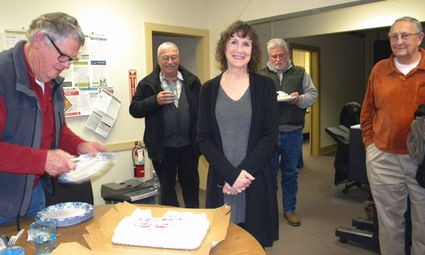Wastewater Treatment Plant is Hot Topic for Dayton Council
City will pursue a pond treatment system to move out of the river
January 18, 2018

Michele Smith
Christine Broughton's service on the Dayton City Council was celebrated with cake at last week's city council meeting. Broughton served on the council from Oct. 2008, until this year. "It went by way too fast," she said.
DAYTON-In his report to the Dayton City Council last week Mayor Craig George summarized the top priorities from the annual Community Economic Development Steering Committee meeting, including included the No. 1 priority, which is upgrading the city's Wastewater Treatment Plant.
George briefly spoke about the Anderson Perry & Associates presentation at the Port's Economic Development Steering Committee in December, regarding the city's plans for upgrading its wastewater treatment plant.
At that meeting, Project Engineer Jake Hollopeter said the direction the city is taking is to be out of the river 12 months out of the year. To do this they need to find a place where a suitable level of treatment can be performed and to land apply wastewater for irrigation purposes by utilizing a Class C Pond System type of treatment.
Hollopeter said this type of system works by pumping wastewater from the treatment facility to a pumping station, where it will be pumped to a site having two aerated treatment cells, followed by two to three storage cells. All the water will go into storage in the winter. Irrigating will begin in April or May so that by September or October the storage capacity volume will be low enough for winter storage.
The technology does not require water impairment analysis since land application is to a crop, such as alfalfa hay, and is not considered a "Beneficial Use," he said.
The cost of the Wastewater Treatment Plant will be around $10 million.
In August 2016 the city submitted a Wastewater Facility Plan to the Department of Ecology, looking at various options.
In October 2017, the city submitted a funding application to the DOE in the amount of $1 million for design, permitting and reporting efforts. The city will find out in January whether it made the initial list, Hollopeter said.
If so, Hollopeter said the city is eligible for a low interest loan with no early penalties and principal forgiveness of fifty percent.
Mayor George pointed out that the majority of funding for the plant will come through the state legislature, the DOE, the USDA and the Department of Health. The city will need to run a bond for about $2 million, which will be paid for by ratepayers, through increased sewer rates, he said.
For the past year, the city has been actively reaching out to local landowners to locate single parcels of land for the Wastewater Treatment Facility.
Once land is identified and purchased, the city will begin holding public information meetings, said George.
Some people had expressed the desire for a Class A Wastewater Treatment Plant, to provide water to the Touchet Valley Golf Course during the hot, dry summer months.
Hollopeter said a Class A plant, to reclaim or reuse the treated wastewater, is not viable for the City of Dayton because it comes with a price tag of around $15 to $18 million, has requirements for water rights impairment analyses, needs more costly equipment and comes with higher maintenance and operator costs.
"At the end of the day, the City of Dayton is in the wastewater business, not the golf course business or farming business," Hollopeter said at the EDSC meeting.
The DOE is asking for design completion in 2019 and construction completion in Dec.2021, said Mayor George. However, the DOE can grant an extension as long as progress is being made, he said.
Eight years ago the DOE said the restricted limits for certain discharge parameters, including nitrogen and phosphorus, into the Touchet River are so low that no treatment facility can achieve them, which has placed the city in a quandary.
There was a significant upgrade to the Wastewater Treatment Plan in the 1990s, before the DOE performed the Total Daily Maximum Load study for the Walla Walla Watershed and the Touchet River in 2008.
"Historically, the DOE said the city is not meeting (discharge) requirements," said City Administrator Trina Cole at last week's council meeting.
"There was a lot of thought process that went into the selection of land application," she said.
It was decided to get out of the river altogether, in case the DOE comes up with stiffer regulations, George said.
Flood Control Zone District
Also at last week's council meeting Mayor George talked about the timeline for creating a Flood Control Zone District in the county. George said a proposal for the creation of a FCZD would likely be on the Nov. 2018 voters' ballot.
Financial Audit
The city's 2014-16 financial audit was positive, said George. The results of the audit will be posted on the city's website and on the state auditor's portal, according to City Administrator Trina Cole.
Administrator's Report
In her report, Cole said prosecuting services with the Gravis Law PLLC will end on Jan. 31. Requests for Proposals have gone out and the city will be looking into hiring for those services.
Cole also said the county and city will partner on an overlay to be done on Main St., to the end of city limits, on S. 4th St. If funding is achieved, the project will be done in 2021-22. A 65% match is required for the grant, which is a Federal Lands Access Grant.
The city is also applying for a Tiger Grant for additional amenities, like new sidewalks.
Cole said the Association of Washington Cities has contracted with a company to appraise city-owned building and land, which will be done in June.
The Dayton City Council authorized :
-Resolution No. 1331- Extending the Planning Service Contract with Columbia County, for an additional six months.
-Resolution No. 1332 – A Code Compliance Contract, which is an interlocal agreement between the city and the county for code compliance services. The city will pay half of the Code Compliance Officer’s wages and benefits, and some overhead, beginning on Feb.1, if the county signs the agreement.
-Approved a Fuel Tax Agreement with the Transportation Improvement Board in 2018, for FEMA funds for repairs on S. Washington St. which will take place in the spring of 2018.
-Council woman Delphine Bailey was elected to serve as Mayor Pro-Tem for 2018.









Reader Comments(0)